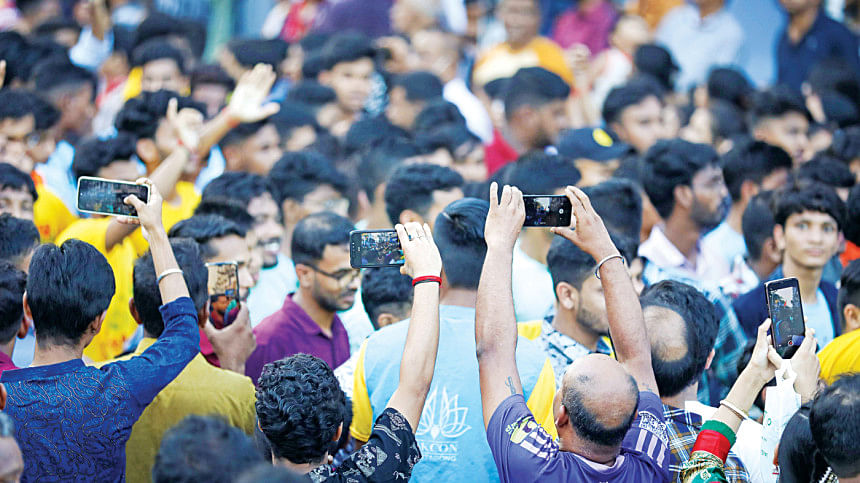BTRC renews efforts to block unauthorised mobile phones

In line with demands from stakeholders, the Bangladesh Telecommunication Regulatory Commission (BTRC) recently reversed its decision to award a contract for the maintenance of the National Equipment Identity Register (NEIR) system through the direct purchase method and instead opted for an open tender process.
The NEIR system is designed to track and block stolen or unauthorised mobile devices using International Mobile Equipment Identity (IMEI) numbers, a unique 15-digit number assigned to every mobile device with cellular connectivity.
The previous government could not fully implement the system due to technical challenges and concerns that it could block millions of unauthorised phones currently in use, potentially triggering severe public backlash.
At the end of December last year, the BTRC initially decided to award the contract to Synesis IT Ltd for Tk 5.67 crore, covering system maintenance and the annual licence fee for Oracle Database support. However, the lack of an open tender process drew the ire of stakeholders, with the Bangladesh Association of Software & Information Services (BASIS) protesting the decision on January 12.
In a letter, BASIS stated that under the Public Procurement Act, 2006, and the Public Procurement Rules, 2008, contracts exceeding Tk 50 lakh cannot be awarded without a competitive bidding process.
BASIS further argued that the contract should not have been awarded without a proper technical assessment.
Granting it to a single entity without a tender process could lead to a monopoly or oligopoly, distorting competition in the local market and violating the Competition Act, 2012, it added.
Now, the telecom regulator has revoked its earlier decision and adopted a quality- and cost-based selection method.
According to BTRC officials, the direct purchase method was chosen to expedite implementation as both the telecom ministry and the National Board of Revenue (NBR) urged the commission to launch NEIR as soon as possible.
The commission selected Synesis IT due to its prior experience with the system, according to official documents.
"We initially opted for the direct purchase method to expedite implementation as the government is losing significant revenue," said Emdad ul Bari, chairman of the BTRC, last week.
The illegal import of mobile phones is costing the government around Tk 2,000 crore in annual revenue, according to a letter sent by the NBR to the BTRC in October last year.
"However, we later realised that even if the system is ready quickly, launching it would still take time due to several unresolved issues.
"For instance, there are cases where hundreds of mobile phones are registered under a single IMEI number. We need to address these complexities before implementation," he added.
"We will implement NEIR in a way that does not cause problems for users, even if it takes longer. That's why we have decided to proceed with an open tender method for greater transparency."
He also assured that existing handsets will not be deactivated once NEIR is implemented.
WHY NEIR INITIALLY FAILED
The BTRC initiated the NEIR project to curb the illegal import and use of mobile handsets, prevent the production and sale of unauthorised devices, combat handset theft, and thwart crimes involving unregistered phones.
On November 25, 2020, the BTRC signed an agreement with Synesis-Radisson-Computer World for the supply, installation, and operation of the NEIR system for Tk 29 crore. After that, a trial run was launched in July 2021.
During the trial, authorities discovered that millions of mobile phones in use were unauthorised, raising concerns that full implementation could trigger significant public dissatisfaction.
Additionally, a technical challenge emerged as hundreds of feature phones in circulation were found to share a single IMEI number, according to people familiar with the proceedings.
Rapid expansion of the grey market is depriving the government of VAT and taxes and threatening investments of companies that have set up plants locally
In October 2021, the system was launched with a key feature—the ability to block unauthorised handsets—causing frustration among mobile phone manufacturers.
Rizwanul Haque, vice-president of the Mobile Phone Industry Owners' Association of Bangladesh, said the grey market for handsets now accounts for over 40 percent of the total market.
"The rapid expansion of the grey market is not only depriving the government of thousands of crores in VAT and taxes but also threatening the investments of companies that have established local manufacturing plants," he said, welcoming the BTRC's latest effort to revive NEIR.

 For all latest news, follow The Daily Star's Google News channel.
For all latest news, follow The Daily Star's Google News channel. 



Comments